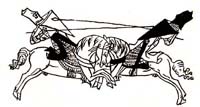 |
Polemics

 |
 |
Five Questions for Msgr. Bruskewitz |
  |
Atila Sinke Guimarães
Published in The Remnant September 15, 2000 and in
Catholic Family News October 2000
In his introduction to the pamphlet Traditionalists, Tradition and Private Judgment, Msgr. Fabian W. Bruskewitz takes a curious position from a strategic point of view. He undoubtedly supports the pamphlet, although he avoids making a deep commitment to its contents. His affirmations of support are vague and leave the door open for a retreat, should the work reveal itself counterproductive to his interests.
Parallel to this, he makes general considerations and moral censures about the spiritual state of the authors of the document We Resist You to the Face and the danger their position would represent. However, concretely, he points out nothing worthy of reproach in the text of the resistance document. The censures are enveloped in rhetorical metaphors or stay in the realm of insinuations that avoid a direct confrontation. Whether he supports the pamphlet or whether he is against the Statement of Resistance, Msgr. Bruskewitz is evasive. One could believe that he is uncomfortably undertaking an order to support one party and combat another. One would hope for a more clear-cut position from a Prince of the Church, a Successor of the Apostles whose mission is to teach and sanctify.
With regard to the attacks, Msgr. Bruskewitz reveals himself less artful than in the care he took regarding his personal position. The metaphors he employs - "removing the eye because of a cinder" and "cutting off the head to cure a headache" - speak neither in favor of great objectivity nor extreme literary care. In effect, if one takes seriously the metaphor "to cut off the head," the signers of the document would be wanting to eliminate the Papacy. This is false.
In our Statement, we present a critique and request a dialogue that in no way supposes the elimination of the Papacy. On the contrary, in the section Final Words, we publicly manifest our love for the Papacy and the Pope. If the metaphor were objective, it would not characterize an act of schism, of which we have been accused, but of heresy. Thus, his metaphor "to cut off the head," beyond being banal and in bad taste, is inadequate by exaggeration. The same could be said about "removing the eye."
Notwithstanding, there is this indisputable fact: Msgr. Bruskewitz is the most important player to date in the campaign that is being made against the document We Resist You to the Face. Since it is not worthwhile to discuss the text of his introduction, which is fundamentally evasive, I will go on to consider his public display against us, the signers of the document, and the endorsement he gives to the accusations of the Editor of The Wanderer and the author of the pamphlet.
Based on these facts, I, speaking in my own name, ask five questions of Msgr. Bruskewitz, in the hope that he will not refuse a response to a devoted son of the Catholic Church at a time when the religious authority readily dialogues with her greatest enemies.
1. Is Msgr. Bruskewitz speaking only for himself or also for the Vatican?
It is interesting to consider that after we asked to begin a dialogue with His Holiness John Paul II or some representative on the matters raised in our document, the Bishop of Lincoln appears to publicly deal with our Statement.
It is commonly understood that Bishops have a feudal promise of obedience to the Pope that is equivalent to a vow. Thus, in principle, everything that a Bishop does comes from a direct or indirect order of the Supreme Pontiff. If we add to this today’s facility of communication, one sees that there could be nothing more simple that an order given by telephone or an instruction by fax. Thus, the Introduction penned by Msgr. Bruskewitz could very well have been made on an instruction from the Vatican. I am working with this possibility.
The tactic employed in the whole campaign against our document is the simple one of barraging us with accusations: Mr. Al Matt, editor of the The Wanderer, accused us of having started off "on a schismatic trajectory that can only have dangerous consequences." In a recent article, leaving aside the subtleties, he accused us more directly of being schismatics. Msgr. Bruskewitz accused us of being proud and compared us to the Jansenists, the Cathars or Albigenses. In the text of the pamphlet, the gratuitous accusations are even more numerous. This seems to indicate that we are facing a strategy of diverting attention away from the real matter at hand. It seems that there is the desire to put us on the defensive by making various unconnected accusations, with the aim of avoiding our suggestion to discuss the facts and general panorama we presented in We Resist You to the Face.
Therefore, it is important to know who is directing the campaign. For this reason, I ask the first question:
Msgr. Bruskewitz, would Your Excellency be so kind as to tell us if you are speaking on behalf of the Vatican? Would this then signify the first step of our requested dialogue?
2. Why didn’t you apply the precept of charity to us?
In his Epistle to Titus (3:10), St. Paul establishes how one deals with heretics. One should speak to them two times in private, show them their error and admonish them. Only on the third time should he condemn them publicly. This precept was taken as a norm by the whole Church to deal either with heretics or those who fall into some error. It is a precept full of wisdom, known as a precept of charity. It is a precept of charity toward those who are in error but who have good will, because it gives them the opportunity to return to the way of truth. It is also a precept of justice. By adopting this procedure, the Church avoids an injustice, for after two private reprimands, those who still choose to remain in error reveal their contumacy.
Now, Msgr. Bruskewitz knows this norm perfectly and perhaps has applied it more than once in relation to progressivist subordinates. Even though, thank God, we are not heretics, the Bishop of Lincoln might think that we had fallen into some error. He has this right. In this case, why didn’t he call us in private in order to instruct us about some alleged error rather than at the first instance publicly coming out against us with a clear desire to damage us, qualifying us as non-Catholic? Haven’t we at least the same right as the heretics? Where is the sense of justice of His Excellency? Where is his sense of charity? By condemning us of insubordination, didn’t he disobey a norm of the Church? Accusing us of pride, didn’t he also cede to an analogous defect?
Msgr.Bruskewitz, would Your Excellency deign to make a response?
3. Is Msgr. Bruskewitz schismatic when he disobeys John Paul II?
The simplified concept of schism and schismatic lends itself to some curious developments. According to this concept, anyone who denies obedience to a Pope - any Pope and for any reason - would be schismatic. In function of this guideline, which is governing the attack against We Resist You to the Face, let me first establish some presuppositions for my next question.
A. The new Code of Canon Law promulgated by John Paul II in 1983 affirms in Can. 212, paragraphs 2 and 3:
"The Christian faithful are free to make known their needs, especially spiritual ones, and their desires to the Pastors of the Church .... In accord with the knowledge, competence and preeminence which they possess, they [the faithful] have the right and even at times the duty to manifest to the sacred Pastors their opinion on matters which pertain to the good of the Church, and they have the right to make their opinion known to the other Christian faithful, with due regard for the integrity of Faith and Morals and reverence towards their Pastors and consideration for the common good and the dignity of persons."
In my opinion,this applies directly to our Statement. That is to say, the cited parts of the Code recognize that the signers, who are laymen and faithful Catholics, have the right and the duty to direct themselves to the Pope in order to make known our opinion for the good of the Church. This is what we did.
B. On a visit to Switzerland in 1984, John Paul II addressed the youth with these words:
"The Church is always a community made up of men who are weak and can err. I would like to add that this is, in fact, our lot. Because in a Church of perfect people, we would certainly have no place. God Himself wants a human Church. For this reason, one may criticize the Church so long as this criticism is loyal
and stems from a great love for the Church." (Allocution to the youth in Einsiedeln, June 15, 1984, Insegnamenti di Giovanni Paolo II, vol. 7/1, pp. 1823-4)
Therefore, John Paul II himself admits and even recommends that one may criticize the Church. Now, if one may criticize the Church for love of her, obviously for the same reason one can criticize papal conduct.
Based on these texts, I sustain that the position of the signers of We Resist You to the Face is guaranteed by the Code of Canon Law and follows the recommendation of John Paul II. Now, if by criticizing John Paul II we obey his own precept, those who deny our right to do this would seem to be disobeying him. From this the question naturally arises the third question I address to the Bishop:
Msgr. Bruskewitz, is Your Excellency in agreement or disagreement with the above aforecited texts of John Paul II? If you are in agreement, why do you accuse us of pride and schism when we are exercising our right and fulfilling our duty? If you are in disagreement, why would Your Excellency be denying obedience to the Pope? Would your Excellency then be schismatic?
4. Would the episcopates of the U.S. and other countries also be schismatic?
An increasingly common phenomenon in this post-conciliar period is that of entire Episcopates which contest the doctrines and orders of the Popes. I will cite some examples.
A. Instruction about homosexuality. In July of 1992, the Congregation for the Doctrine of the Faith directed to the North American Bishops an Instruction about homosexual persons, which admitted that there should be some discrimination of such persons in schools, seminaries and armies (La Repubblica, 18.VII.1992; Avvenire, 24.VII.1992; Origins, 6.VIII.1992).
As soon as the document became public, then Archbishop of San Francisco John Quinn, Archbishop of Milwaukee Rembert Weakland, Archbishop of Seattle Thomas Murphy, and the Bishop of Houston spoke out against it (The Wanderer, July 30, 1992).
Even if the president of the North American Bishops Conference Msgr. Daniel Pilarczyk praised some points of the document, in a clear insinuation of disagreement he affirmed his belief that the American Bishops should continue their efforts to see that homosexuals do not suffer any unjust discrimination (Dispatch of the United States Catholic Conference, July 22, 1992). In effect, this disagreement was confirmed by an observer at the Bishops Conference when he stated that "the majority of the Bishops are going to ignore" the document of the Holy See (San Francisco Chronicle, July 25, 1992).
According to the concept of schism presupposed by Msgr. Bruskewitz, the majority of American Bishops would be schismatic for having taken this attitude.
B. Pastoral on women. In 1983 the North American Bishops’ Conference began work on a collective pastoral letter on
women (New York Times, November 17, 1992). The first draft, presented in 1988, requested that the minor orders of the deaconate be opened to women (New
York Times, November 19, 1992) and that they should be ordained as priests
(30 Dias, December 1992, p. 24). The second plan, presented in 1990, asked only for their ordination as deaconesses (New York Times, November 19, 1992). The third, with a more moderate tone, presented in 1992, spoke of the need for a study about the ministries in the Church in order to see where women could be introduced (ibid.). Finally, the fourth and definitive version, approved in 1992 by 137 votes to 110, accepted the traditional teaching of the Church (ibid.; 30 Dias, December 1992, p. 24).
It should be noted that between the first and second versions there was a meeting of the North American Bishops with the Pope in Rome (O Estado de São Paulo, March 8, 1989), which was interpreted as a confrontation over the moral themes (30 Dias, June 1989, p. 59). In the case of the pastoral on women, the Vatican managed to avoid the publication of the original draft (The Dallas Morning News, November 19, 1992), but received the open and declared opposition of 110 Bishops.
According to recent press reports and the growing wave favoring the role of women in the Church, one can conjecture that at least these 110 Bishops would have continued to speak out on their positions contrary to that of Rome. To judge by the criteria of Msgr. Bruskewitz, all of these would be schismatic.
C. Other moral themes. Similar considerations could be made with regard to divorce, birth control and pre-matrimonial relationships. That is to say, there are numerous American Bishops who have publicly ordered or admitted that in their Dioceses they permit actions contrary to what is being officially taught by John Paul II.
According to the concept of schism presupposed by Msgr. Bruskewitz, all of these would be schismatic.
D. Humanae vitae. The most notable case of direct insubordination and disobedience to papal teachings and orders on the part of entire Episcopates took place on the occasion of the publication of the Encyclical Humanae vitae of Paul VI (1968). The subject was the prohibition of artificial methods of birth control.
With regard to the doctrine of Humanae vitae, the Bishops Conferences of Austria, Belgium, Brazil, Canada, France, Germany, Holland, Scandinavia and Scotland directly denied obedience to Paul VI. These important bodies declared that the doctrine of the encyclical was not infallible, that it did not need to be put into practice, and that the faithful have the right to decide for themselves if they should or should not use artificial methods of birth control. In the United States, professors of the University of Washington wrote a public letter of protest that was signed by 645 theologians (Informations Catholiques Internationales, September 15, 1968, p. 22; 30 Giorni, July 1988, p. 50).
Once again, applying the same criteria that Msgr. Bruskewitz and his disciples applied to us, all of these would be schismatic.
E. Other papal documents. Something analogous, but less intense, was repeated on the occasion of Veritatis splendor of John Paul II, as well as in relation to other papal or Vatican documents, such as the Conciliar Catechism, the document on the power of teaching in Bishops’ Conferences, and the orientation given on the question of pedophilia on the part of clerics.
For Msgr. Bruskewitz, all of these acts of disobedience would characterize schismatic attitudes.
Given these various cases I have just described, the question I ask becomes unavoidable:
Msgr. Bruskewitz, does Your Excellency admit that, based on the same concept of schism that you presupposed to attack us, you would also have to qualify the various Episcopates that I mentioned, including the American Episcopate in which you are included, as schismatic? However, there is no report of such an attitude on your part. Why didn’t Your Excellency attack your colleagues in the Episcopate who would be guilty of a similar crime?
If they are schismatic, wouldn’t this characterize a dramatic situation in the Holy Church? If Your Excellency admits that entire Episcopates have removed themselves from the ecclesiastical discipline, why did you qualify this situation as a "cinder in the eye" when you wrote your lines against us?
By diminishing the gravity of the situation, doesn’t Your Excellency help to spread the illness in the Church? Or does Your Excellency not consider such episcopal disobedience to be schismatic? In that case, why would our suspension of obedience deserved to be qualified as schismatic while the effective disobedience of various Episcopates should be considered normal?
Could Your Excellency explain the coherence of the criteria you are using?
5. Why have religious authorities prohibited discussion of Vatican II?
It is interesting to consider that after Vatican Council II, at the initiative of the Conciliar Popes, some truths of prior dogmatic declarations began to be relativized. To restrain myself to the pontificate of John Paul II and to the relativizations that have been made of Ecumenical Councils, I will give only two recent examples.
With the suggestion made by the present day Pontiff to re-study the way to exercise the "ministry of Peter" (Ut unum sint, 95), the dogmatic doctrines of Vatican Council I regarding the Primacy of the Jurisdiction of the Pope and his Papal Infallibility were put on the table for discussion. A similar affirmation could be made with respect to the doctrine of justification of the Council of Trent, relativized by the Catholic-Lutheran accord of Augsburg. Many other examples could be cited.
Now, such initiatives were born from the Pope or very high ecclesiastical authorities, which are his close advisers. Therefore, one could say that permission to discuss all theological questions, even those already sealed by infallibility, has been established.
However, the same authorities who permit this disputable liberty with regard to past dogmas, peremptorily deny that there be any public discussion of the teachings and the validity of Vatican Council II, which did not intend to be dogmatic.
Even the present assault against the signers of We Resist You to the Face seems to be an attempt to divert attention away from the topics that we suggest discussing, that is, Vatican II, its reforms and the actions of the Conciliar Popes.
For today, I place here my last question to Msgr. Bruskewitz:
Could Your Excellency explain to me why you refuse to analyze the text of our
Statement, especially in its critique of Vatican II and its reforms? What is this mysterious cloud surrounding the lastCouncil that does not permit it to be touched in a public discussion? Why not initiate the public dialogue that we are requesting?
Your Excellency can see that although the accusations launched against the signers of We Resist You to the Face are not objective, these imputations at least have a positive side. They raise the possibility of dealing with some fundamental issues that will perhaps bring some light to those who love the Church, and help them to see more clearly in the confusion of the present day crisis. This is what I am trying to do. It is one of the fruits of inter-communication. I take advantage of this opportunity to respectfully invite Your Excellency to an elevated and cordial dialogue. I am certain there would be many other questions to discuss and interesting themes to raise. However, in case Your Excellency refuses to dialogue and wants to continue with a polemic, to the measure that my modest capacities permit, I would also be at your disposition.
Next Article

Other Articles in the Polemic
 Some Presuppositions Some Presuppositions
Presuppositions and context of the controversy
 The Bishop's Preface The Bishop's Preface
Bishop Fabian W. Bruskewitz
 Anecdotes, Trajectories & Headaches: A Letter to Bishop Bruskewitz Anecdotes, Trajectories & Headaches: A Letter to Bishop Bruskewitz
Jonathan Tuttle
 His Excellency's Insinuations His Excellency's Insinuations
Marian Therese Horvat, Ph.D.
 An Apology to Atila Guimarães and
Marian Horvat An Apology to Atila Guimarães and
Marian Horvat
Stephen Hand


|
Polemics | Home | News | Books | CDs | Search | Contact Us

© 2002-
Tradition in Action, Inc. All Rights Reserved
|
 |
|
